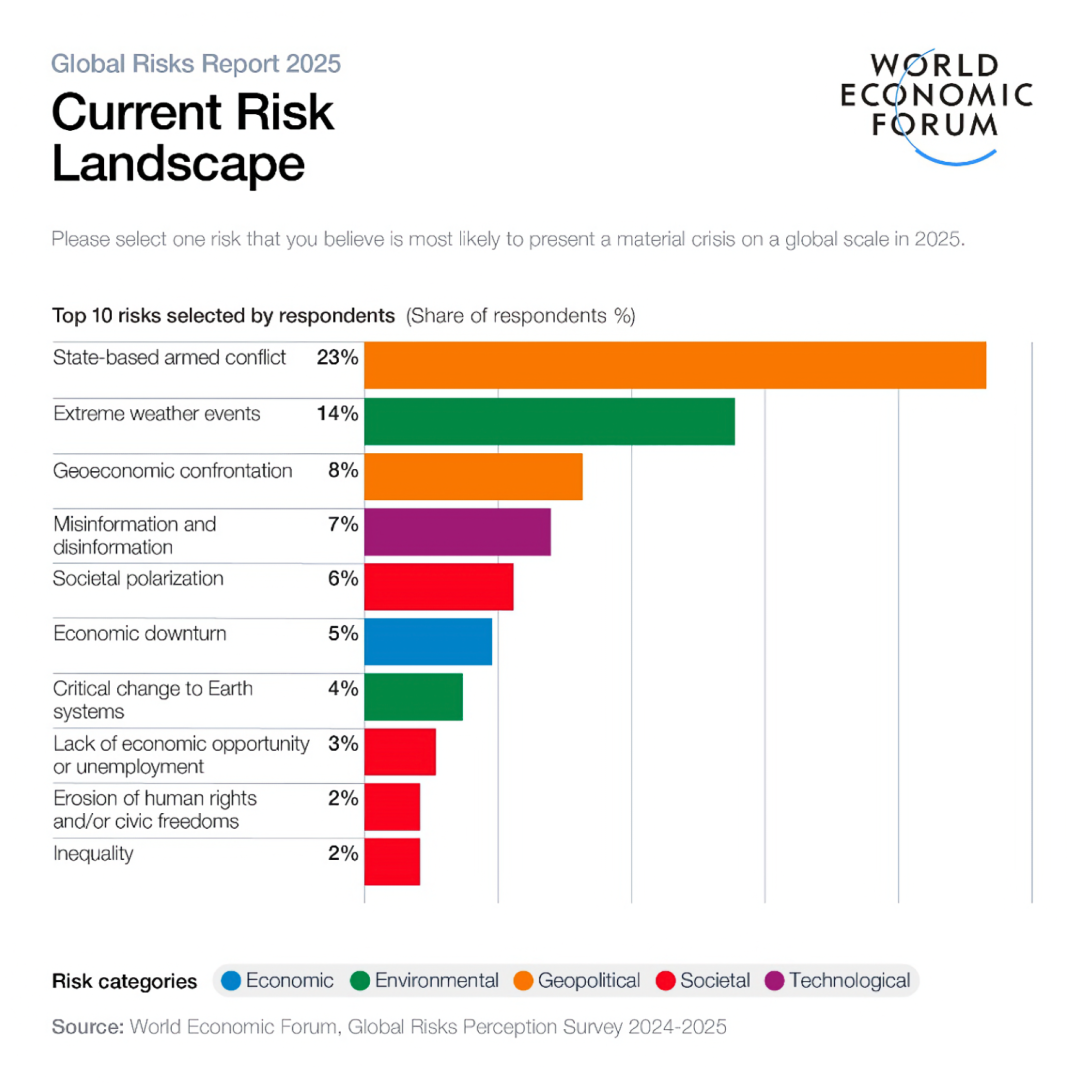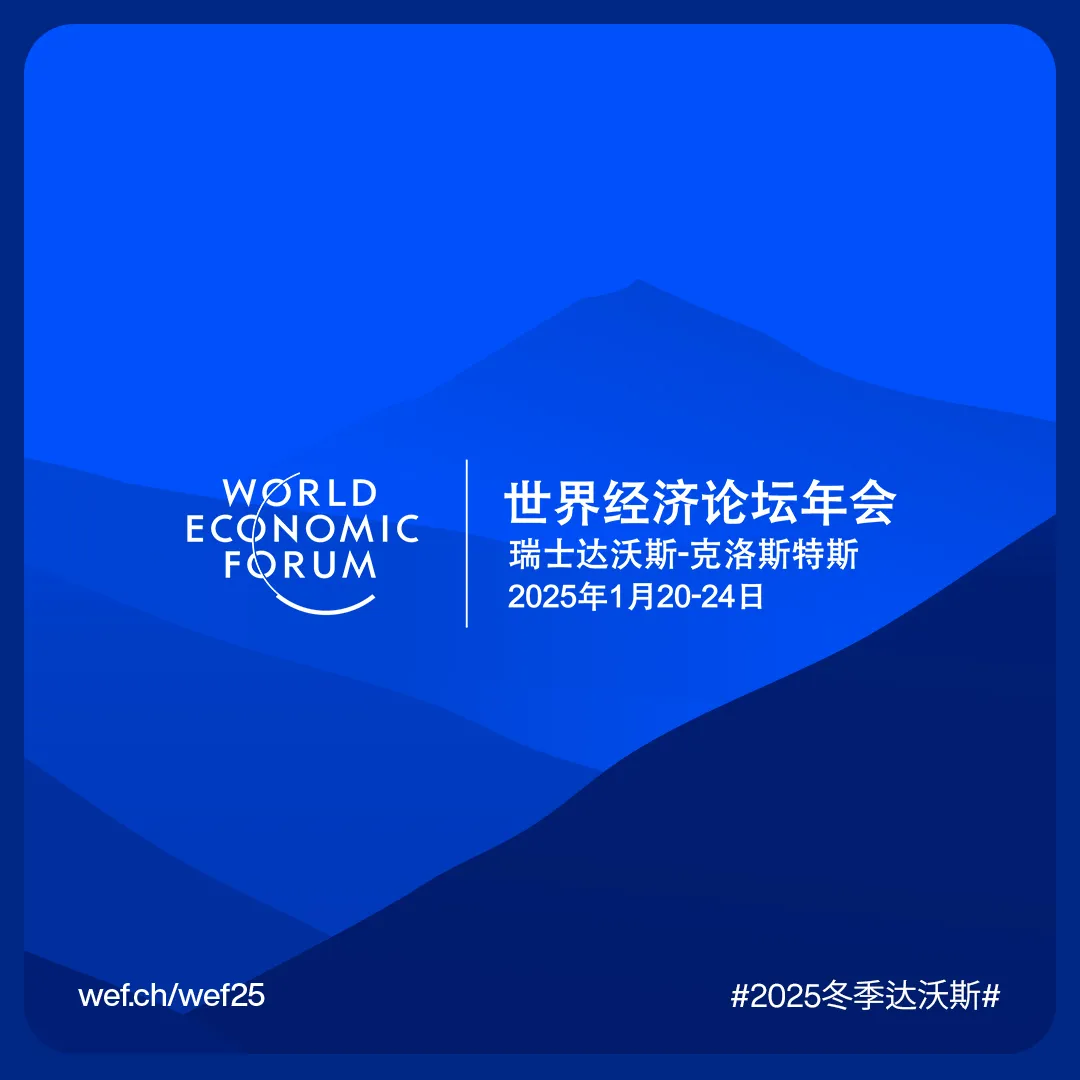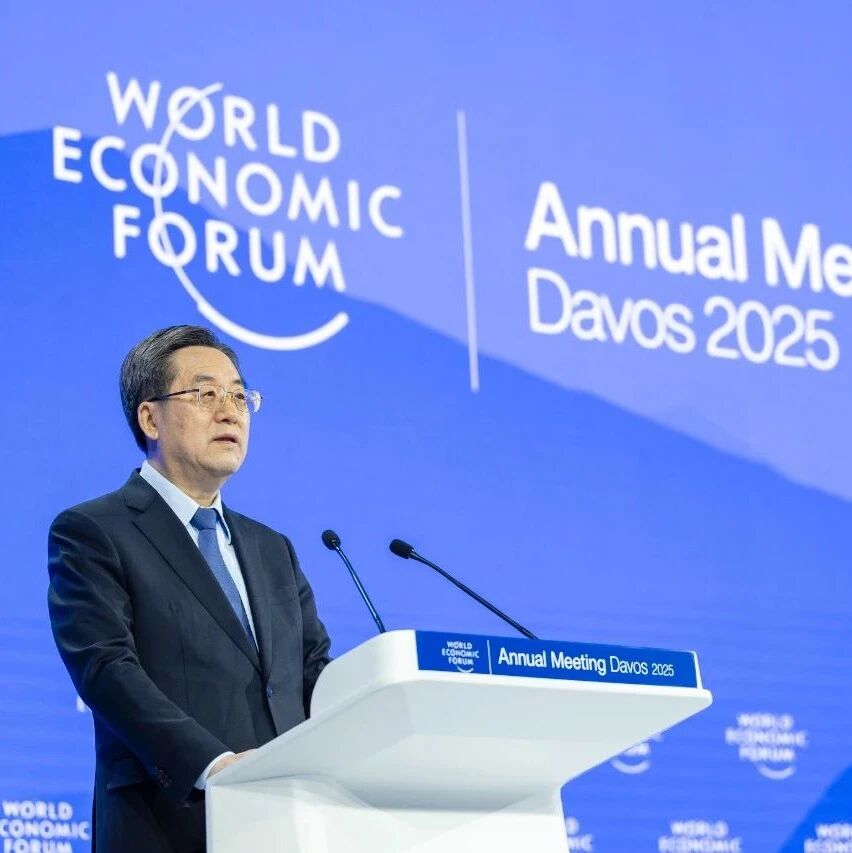Nearly a quarter of respondents believe that armed conflicts between nations pose the primary direct risk in 2025, reflecting heightened global geopolitical tensions and growing divisions.
Misinformation and disinformation have emerged as the primary short-term risk factor, potentially exacerbating instability, eroding public trust in governance, and further complicating the urgent need for collaborative efforts to address shared crises.
In the ten-year outlook, environmental risks driven by extreme weather events, biodiversity loss, and ecosystem degradation take center stage.
To read the "2025 Global Risks Report," please click to read the original article. Feel free to join the conversation on social media using the hashtag #Risks25#.
The 20th edition of the Global Risks Report, released today by the World Economic Forum, reveals that the global landscape is becoming increasingly fragmented, with escalating geopolitical, environmental, social, and technological challenges threatening stability and progress. While economic risks have slightly diminished in significance this year, the economic factors closely tied to social and geopolitical tensions remain a significant cause for concern. Notably, armed conflicts between nations have been identified as the most immediate and pressing global risk by 2025—cited by nearly one-quarter of respondents as their top worry over the coming year.
False and misleading information have remained the top short-term risk for two consecutive years, continuously posing a significant threat to social cohesion and governance. These harmful narratives erode public trust and deepen divisions—both domestically and internationally. Other key short-term risks include extreme weather events, societal polarization, cyber espionage, and the looming specter of war.
Environmental risks dominate the long-term outlook. Extreme weather events, biodiversity loss and ecosystem collapse, critical shifts in Earth's systems, and growing shortages of natural resources all rank among the top risks for the next decade. Among these environmental threats, pollution sits at number five—but it also emerges as the primary short-term risk. Although it’s currently ranked sixth in terms of immediate concerns, this reflects a heightened awareness of the severe health and ecological impacts caused by various pollutants in air, water, and soil. Overall, extreme weather events clearly stand out as one of the most pressing risks—ranging from direct, short-term threats to long-term challenges.
In the long term, technological risks associated with misinformation, disinformation, and the negative consequences of AI technologies could have a significant impact.
"Escalating geopolitical tensions, the erosion of global trust, and the daunting challenges posed by the climate crisis are intensifying global pressures in ways we’ve never seen before," said Mirek Dušek, Managing Director of the World Economic Forum. "In a world marked by deepening divisions and mounting risks, global leaders now face a critical choice: Will they commit to fostering collaboration and building resilience, or will they allow instability to continue spiraling out of control? The stakes of this decision have never been higher."

A fragmented system, a fragile future
The report compiles insights from more than 900 global risk experts, policymakers, and industry leaders, gathered between September and October 2024, offering a stark outlook for the next decade. Respondents were significantly less optimistic about the world’s long-term prospects compared to its short-term ones. Nearly two-thirds of respondents predict that by 2035, the global landscape will remain highly unstable—driven by escalating environmental, technological, and societal challenges.
More than half of the respondents expect several destabilizing factors to emerge within the next two years, starkly highlighting the widespread fragmentation in global cooperation. Long-term projections suggest that as cooperative frameworks come under mounting pressure, the challenges ahead will only grow more daunting. Among both short-term and long-term risks, social risks—particularly issues like inequality and societal polarization—continue to rank prominently. Meanwhile, growing concerns over illicit economic activities, the escalating burden of debt, and the concentration of strategic resources underscore the heightened vulnerability that could undermine global economic stability in the coming years. Collectively, these challenges risk exacerbating domestic instability, eroding public trust in governance—and ultimately complicating efforts to tackle pressing global issues.
All 33 risks in the ranking showed an upward trend in their long-term severity scores, reflecting respondents' growing concerns about these risks becoming more frequent or intense over the next decade.
Mark Elsner, Global Head of the World Economic Forum’s Global Risks Initiative, noted: "From geopolitical divides to climate change, we are facing a series of interconnected crises that demand urgent, coordinated, and collective action—to rebuild trust and foster collaboration. If we fail to act, the consequences will ripple across generations to come."
The Decisive Decade: Stability Depends on Collaboration
As deepening divisions and fragmentation reshape the geopolitical and economic landscape, effective global cooperation has become more urgent than ever. Yet, 64% of experts predict that the global order will increasingly fragment—driven by competition among middle powers and major nations—placing immense pressure on multilateralism in the process.
However, turning inward and isolating oneself is by no means a viable solution. The next decade will be critical, as global leaders must address complex, interconnected risks and tackle the limitations of existing governance structures. To break the vicious cycle of instability, rebuild trust, strengthen resilience, and create a sustainable, inclusive future for all, nations should prioritize dialogue, reinforce international ties, and foster an environment conducive to renewed cooperation.
About the "Global Risk Report"
The "Global Risks Report" is the World Economic Forum’s flagship publication on global risks, now in its 20th edition. Produced by the Forum’s Global Risks Initiative within the Center for the New Economy and Society, the report is based on insights from the Global Risk Perception Survey, which gathers input from over 900 global leaders across business, government, academia, and civil society organizations. The report identifies and analyzes the most pressing risks—both immediate and long-term—providing leaders with forward-looking insights to tackle emerging challenges. It serves as a vital resource for understanding the ever-evolving landscape of global risks and fostering collective action toward building a more resilient future.
For more information, please visit the World Economic Forum’s Global Risks Initiative website to read the full report.
Regarding the 2025 World Economic Forum Annual Meeting
The 2025 World Economic Forum Annual Meeting will take place from January 20 to 24 in Davos-Klosters, Switzerland, bringing together global leaders to discuss the theme "Collaboration in the Age of Intelligence." The event will focus on fostering new partnerships and inspiring fresh insights, aiming to shape a more sustainable and inclusive future amid rapid technological advancements. Key areas of emphasis include reimagining growth, driving industry transformation in the intelligent era, investing in people, safeguarding our planet, and rebuilding trust. For more details about the annual meeting, visit the World Economic Forum website.
Feel free to share this on WeChat Moments; please leave a comment below the post if you’d like to republish.
The World Economic Forum is an independent and neutral platform dedicated to bringing together diverse perspectives to discuss critical global, regional, and industry-specific issues.
Follow us on Weibo, WeChat Video Channels, Douyin, and Xiaohongshu!
"World Economic Forum"



